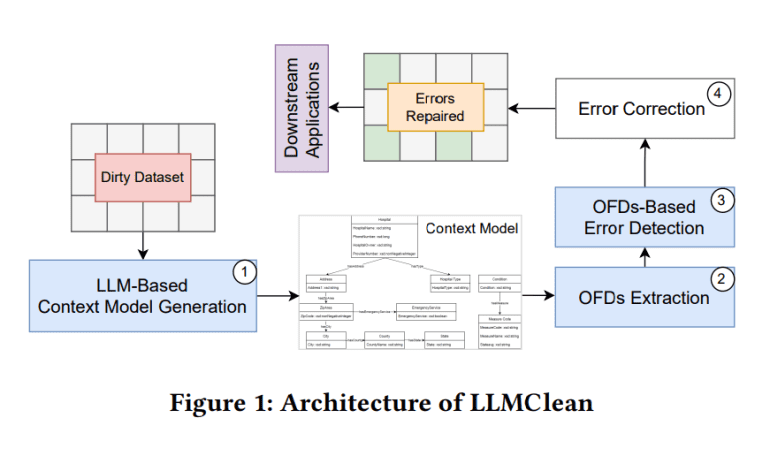- LLMClean is an AI-powered solution for maintaining data integrity in the era of Big Data and IoT.
- It leverages large language models to automate the generation of context models from diverse datasets.
- By extracting Ontological Functional Dependencies (OFDs), it enhances error detection and correction precision in ML workflows.
- LLMClean offers a scalable and efficient alternative to manual data cleaning methods.
- Its three-stage architectural framework integrates LLM models, context models, and data-cleaning tools.
- LLMClean introduces Sensor Capability Dependencies and Device-Link Dependencies for precise error detection in IoT datasets.
Main AI News:
In the era of Big Data fueled by the Internet of Things (IoT), the challenge of maintaining data integrity has never been more critical. As enterprises harness vast amounts of data to drive strategic decisions, ensuring the reliability and accuracy of this information is paramount. However, the proliferation of IoT devices coupled with declining data acquisition costs has led to an inundation of data, making quality assurance a formidable task.
Machine Learning (ML) lies at the heart of many industries’ operations today, relying heavily on high-quality training data. Yet, the presence of inaccuracies, biases, and inconsistencies within real-world datasets poses a significant threat to the effectiveness of ML applications. Traditional approaches to data cleaning often fall short in addressing these challenges, necessitating a more sophisticated solution.
Enter LLMClean, an innovative platform that leverages the power of large language models (LLMs) to automate the generation of context models from diverse datasets. By extracting Ontological Functional Dependencies (OFDs) directly from the data, LLMClean enhances error detection and correction precision, ensuring data integrity throughout the ML workflow.
Unlike manual methods that are labor-intensive and time-consuming, LLMClean offers a scalable and efficient alternative. Its three-stage architectural framework seamlessly integrates LLM models, context models, and data-cleaning tools to identify and rectify erroneous instances in tabular data. This automated approach not only addresses scalability and adaptability concerns but also ensures consistency across diverse datasets.
Moreover, LLMClean goes beyond traditional context modeling by introducing Sensor Capability Dependencies and Device-Link Dependencies, crucial for precise error detection in IoT datasets. By automatically generating comprehensive context models, LLMClean empowers enterprises to tackle the evolving challenges of data quality management with confidence and precision.
Conclusion:
The introduction of LLMClean marks a significant advancement in data quality management, particularly for industries reliant on Machine Learning and IoT technologies. By automating the generation of context models and enhancing error detection precision, LLMClean addresses critical challenges in maintaining data integrity, offering businesses a reliable solution to navigate the complexities of the data landscape. This innovation is poised to drive efficiency, accuracy, and competitiveness in the market for data management solutions.

